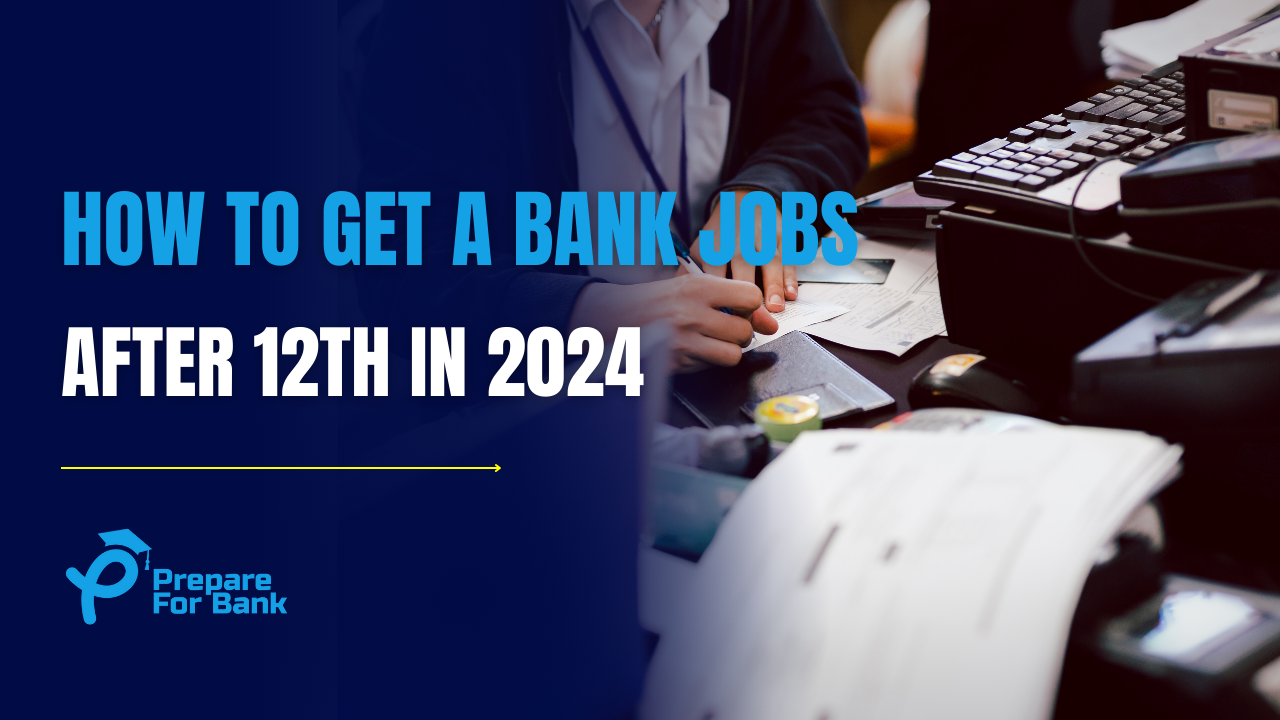Introduction
The Indian banking sector presents promising career prospects for 12th pass students, with a burgeoning demand for skilled individuals. A career in Indian banking offers stability, growth, and the opportunity to contribute significantly to the nation’s economy. This article will provide guidance on how to get a bank jobs after 12th in 2024.
Bank Jobs Options After 12th in 2024
Public Sector Banks (PSBs)
Public sector banks (PSBs) government bank jobs after 12th play a pivotal role in the Indian economy and provide various entry-level positions. Popular PSB recruitment exams such as IBPS Clerk, SBI Clerk, and RBI Assistant assess areas like Quantitative Aptitude, Reasoning, and English.
Private Sector Banks
Private banks often recruit through direct applications and interviews, seeking specific skills and qualifications from candidates.
Other Opportunities
Alternative roles like Customer Service Representative and Data Entry Operator are also available in the Indian banking sector.
List of Bank Jobs After 12th

| Job Profile | Educational Qualification | Average Salary |
| Stenographer | 60% in 12th Boards,SSC Stenographer Exam | ₹3.3 lakhs per annum |
| Data Entry Operator | 12th pass in any stream | ₹2.1 lakhs per annum |
| Telecaller | 12th pass in any stream,Microsoft certifications | ₹1.9 lakhs per annum |
Lets discuss how to begin a career in banking in detail:
Stenographer
Stenographers are specialists in transcribing languages into shorthand code using stenography skills and machines. They accurately record official, academic, medical, legal or business information in shorthand and transcribe it. Apart from transcribing, stenographers may also be responsible for typing, compiling and organizing office documents.
Stenography is a trendy banking job choice after 12th standard. The typical eligibility age is 18-25 years.
Qualification Criteria:
- Minimum 60% marks in 12th board from a recognized educational board
- Clear banking recruitment exams like SSC Stenographer post-12th
- Average Compensation: Around ₹3.3 lakhs per annum
Data Entry Operator
Data entry is a popular banking jobs option pursued after 12th by students. Data entry operators are responsible for accurately entering all requisite information into computers. This indoor clerical role requires computer proficiency and language abilities.
Key Duties:
- Preparing data files by sorting information
- Ensuring error-free data entry
- Compiling, verifying and organizing source data for entry
- Providing authorized personnel timely data access upon request
Qualification Criteria
- 12th pass in any academic stream
- Microsoft Excel & Office certifications advantageous
- Average Salary: Around ₹2.1 lakhs per annum
Telecaller
Telecalling is one of the most preferred banking job roles opted by students immediately after 12th to start earning. Telecallers are responsible for assisting clients, addressing their queries telephonically or in-person, and generating sales by contacting existing and potential customers.
This customer service role requires excellent command of languages like English and Hindi as needed, along with basic computer skills.
Qualification Criteria:
- 12th pass in any stream from a recognized educational board
- Average Salary: Around ₹1.9 lakhs per annum
Must-have Skills for Bank Jobs After 12th

Strong communication, numerical and analytical ability, computer literacy, teamwork, and customer service skills are essential for aspiring banking professionals.
Communication Skills
Since bank employees interact daily with customers to address inquiries, explain financial concepts, etc., excellent oral and written communication skills are vital.
Customer Service Skills
Client service entails problem-solving, active listening, empathy, and communication. Strong customer service skills ensure consumer satisfaction and retention, whereas poor service causes negative feedback and dissatisfaction.
Analytical Skills
The ability to logically analyze data and resolve problems demonstrates strong analytical skills, which enable addressing diverse banking issues.
Teamwork
Operating cohesively within groups by guiding, influencing, communicating openly, and collaborating depicts good teamwork.
As aspirants pursue banking courses post 10+2, honing these competencies will increase their chances of securing jobs after 12th board exams.
Now that key banking job skills are understood, let us explore specific roles available after 12th standard.
Desirable Skills
Knowledge of banking products and services, as well as proficiency in local languages, are desirable attributes for candidates.
This section delves into the eligibility criteria and essential skills required for pursuing a career in the Indian banking sector after 12th. It emphasizes the academic qualifications needed, essential skills such as communication and analytical ability, and desirable attributes that can enhance a candidate’s prospects in the sector.
Banking Recruitment Exams Post 12th – Gateway to Banking Careers

Understanding Banking Exams
After 12th grade, numerous entry-level banking exams offer students the opportunity to kickstart rewarding careers in the banking sector in clerical, assistant and officer roles.
Major Banking Exams
IBPS Clerk Exam – Conducted by the Institute of Banking Personnel Selection for clerical cadre jobs across various public sector banks. Resources: IBPS Clerk Syllabus
SBI Clerk Exam – Held by State Bank of India for recruitment of Junior Associates for customer support and sales roles in its branches. Resources: SBI Clerk Syllabus
RBI Assistant Exam – Reserve Bank of India conducts this exam for assistant positions, providing an avenue into the central bank. Resources: RBI Assistant Syllabus
Banking Jobs After 12th – Eligibility Essentials

Academic Qualification
- Minimum 12th pass for most entry-level banking jobs. Higher positions may require bachelor’s degrees in relevant domains like finance, accounting etc.
Age Limit
- Typical age range is 18-25 years for entry-level banking jobs. Varies across banks and roles.
Nationality
- Candidates generally must be citizens of the country where the bank is located. For instance, Indian citizenship required for most public sector bank jobs in India.
Competencies
- Basic math proficiency and communication abilities are must-haves.
- Banking software knowledge and strong analytical thinking valued.
Exams
- Competitive exams like IBPS PO, IBPS Clerk, SBI PO etc. mandatory for some public sector bank jobs.
- Test quantitative, reasoning, language and general awareness skills.
Language Fluency
- Proficiency in native/national languages often required. Fluency in Hindi and English preferred for Indian banks.
Fitness Requirements
- Some field and security roles may have specific physical fitness needs.
Screening
- Educational, criminal and credit background verification done to ensure employee credibility.
Training & Certification
- Banking and finance certifications beneficial though not always compulsory.
- Many banks provide on-job training for new hires.
Exam Preparation and Application Process

Exam Preparation
Thorough preparation is crucial due to the competitive nature of bank exams in India. Developing a study plan, using recommended resources, and managing time effectively are key to success. Some tips on how can you prepare for bank exam after 12th:
- Application Process
- Finding Suitable Vacancies
- Candidates can find suitable vacancies on official bank websites, job portals, and in newspapers.
- Filling Online Applications
- Document Requirements
The application process should be completed step-by-step, ensuring all necessary details are provided accurately.
Candidates must prepare necessary documents such as marksheets and certificates as per the requirements of Indian banking institutions.
Test yourself by solving these papers:
- Free Mock Test For Bank Exam
- Mock Test For Bank Exam Preparation
- Full Length Mock Test For Bank Exam
Cracking the Exam & Interview and Additional Tips

Exam Day Tips
Candidates should focus on time management, accuracy, and maintaining composure under pressure during Indian banking exams.
Interview Preparation
Researching the bank, practicing common questions, and presenting oneself professionally are essential for interview success in the Indian banking sector.
Interview Do’s and Don’ts
Candidates should project confidence, articulate well, and maintain positive body language during interviews with Indian banking institutions.
Additional Tips
Developing Soft Skills
Soft skills such as communication, teamwork, and customer service are crucial in the Indian banking sector.
Staying Updated
Keeping track of current banking trends, regulations, and technology is important for career growth in the Indian banking sector.
Conclusion
The Indian banking sector presents excellent career opportunities for 12th pass students. Public sector banks and private banks recruit for many entry-level jobs like clerk, data entry operator, and customer support.
These roles offer stability, growth prospects, and the chance to boost India’s economy. To get hired, candidates must pass competitive exams that evaluate quantitative, reasoning, language and general awareness skills.
Strong communication abilities, customer service orientation, and teamwork are must-have soft skills too. By finding vacancies, applying correctly, preparing thoroughly for tests, and developing industry knowledge, 12th pass aspirants can obtain fulfilling banking careers.
With technology expansion and financial inclusion, Indian banking will generate increased recruitment going forward. The future looks bright for today’s passionate and diligent 12th pass job-seekers.


